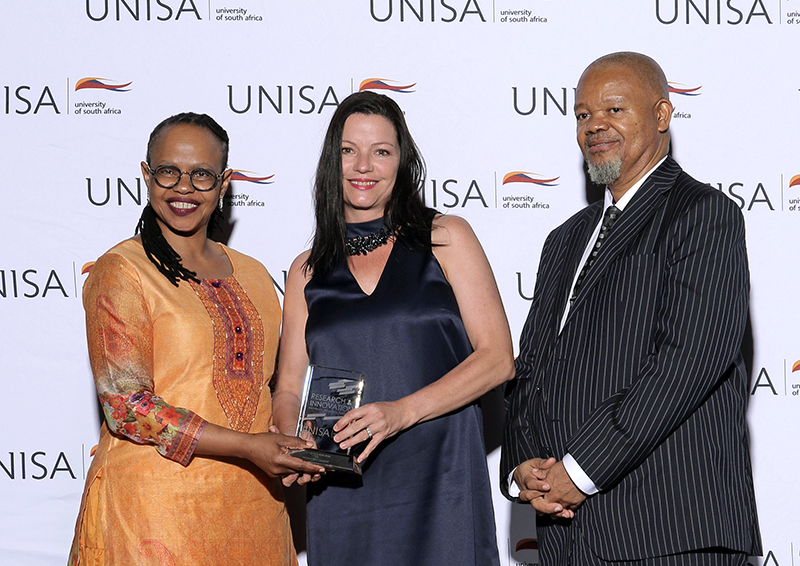

Prof Thenjiwe Meyiwa (VP: Research, Postgraduate Studies, Innovation, and Commercialisation) and Prof Mandla Makhanya (Principal and VC) congratulate Prof Ann-Mari Hesselink (CLAW) (centre) on her 2020 NRF C Rating.
Professor Ann-Mari Hesselink from the College of Law (CLAW) has been re-rated in 2020 as a C3 researcher by the National Research Foundation (NRF). Ranked the first time in 2015, this rating is for a further five years, which will be valid from 2020 to 2025.
While this is an exciting achievement for any researcher, Hesselink explains that this retained rating is equally stressful for her, “especially with tuition duties, being responsible for more than one module, the tuition administration, community outreach projects, and with my volunteer services—it becomes hectic to produce research. More research outputs are expected from an NRF-rated academic and this, together with the tuition workload, is very difficult,” she says.

Prof Ann-Mari Hesselink's body of quality work critically supports government priorities while placing Unisa research outputs at the core of contributing to the knowledge and information society.
Hesselink’s research contributions started in 2001 with publications on child abuse and child prostitution. This was followed by an incorporation of the assessment, analysis, and profiling of criminal behaviour from a criminological perspective into her research. This broadened focus allowed her to work with various forms of criminality and offenders, including serial offenders (murderers and sexual offenders), armed robbers, cash-in-transit robbers, sex offenders (including gang rapists, men who raped babies, and paedophiles), economic offenders, narcotic-crime-related offenders, and other types of violent and aggressive offenders.
An NRF C rating implies that a researcher is established with a sustained recent record of productivity in the field. Hesselink is therefore recognised by her peers as having produced a body of quality work, the core of which has coherence and attests to ongoing engagement with the field, demonstrate the ability to conceptualise problems and apply research methods to investigating them. Much work goes into realising these merits; for Hesselink, her field of research entails:
When asked what inspires her research work, Hesselink explains that “my passion for criminology lies in the understanding of criminal behaviour in identifying, tracing and explaining the causes, contributory factors, motives, triggers and high-risk factors that contributed to offenders to involvement in crime. My research furthermore illustrates scientific care to logically link and explain criminal behaviour that has become a vital contribution with the South African criminal justice system and within corrections.”
Some of Hesselink’s research highlights and achievements have seen her research contributing towards an innovative and new field in criminology known as correctional criminology, where criminologists are utilised to conduct risk assessments for the Department of Correctional Services. This paved the way for South African criminologists to practically apply and contribute scientific knowledge and to be recognised as experts in crime and criminal behaviour. Because of her research and her volunteer criminological services offered to the Department of Correctional Service for over 27 years, South African criminologists are now included in the correctional field by applying their expert and niche skills and knowledge in practice with the assessment, identification, analysis, and scientific explanation of criminal behaviour in all its facets.
Through these achievements, Hesselink’s research critically supports government priorities while placing Unisa research outputs at the core of contributing to the knowledge and information society. Asked what she aims to achieve after this rating, she says, “I intend to continue producing quality research that will be recognised within an international and multidisciplinary sphere.”
The NRF rating system is a key driver in the foundation’s aim to build a globally competitive science system in South Africa. It is a valuable tool for benchmarking the quality of researchers against the best in the world. The ratings are allocated based on a researcher’s recent research outputs and impact as perceived by international peer reviewers. The rating system encourages researchers to publish high quality outputs in high impact journals/outlets. Rated researchers as supervisors impart cutting-edge skills to the next generation of researchers.
*By Tshimangadzo Mphaphuli, Senior Journalist, Department of Institutional Advancement
Publish date: 2020-05-29 00:00:00.0